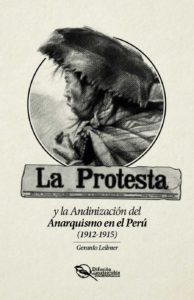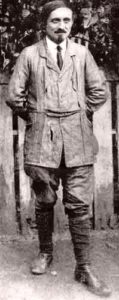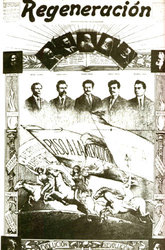“(…) en este articulo intentaré iluminar una etapa (…) en la cual consideramos que se procesa el cambio sustancial en la actitud de los anarco-sindicalistas limeños con respecto a la cuestión indígena, creándose durante la misma una nueva actitud ideológica, consciente y explícita.
Continue reading La Protesta y la Andinización del Anarquismo en el Perú, 1912-1915 (Gerardo Leibner))
Tag Archives: 1912
Émile Armand (21 texts)
Is the Illegalist Anarchist our Comrade?
Émile Armand (1911)
(Notes: From “L’Illégalist anarchiste, est-il notre camarade?” Paris and Orleans, Editions de “l’en-dehors.” [n.d].Translated for marxists.org by Mitchell Abidor.)
When we consider the thief as such we can’t say that we find him less human than other classes of society. The members of the great criminal gangs have mutual relations that are strongly marked with communism. If they represent a survival from a prior age, we can also consider them as the precursors of a better age in the future. In all cities they know where to address themselves so they’ll be received and hidden. Up to a certain point they show themselves to be generous and prodigal towards those of their milieu. If they consider the rich as their natural enemies, as a legitimate prey — a point of view quite difficult to contradict — a large number of them are animated by the sprit of Robin Hood; when it comes to the poor many thieves show themselves to have a good heart.
(Edward Carpenter: Civilization, its Cause and Cure.)
I am not an enthusiast of illegalism. I am an alegal. Illegalism is a dangerous last resort for he who engages in it, even temporarily, a last resort that should neither be preached nor advocated. But the question I propose to study is not that of asking whether or not an illegal trade is perilous or not, but if the anarchist who earns his daily bread by resorting to trades condemned by the police and tribunals is right or wrong to expect that an anarchist who accepts working for a boss treat him as a comrade, a comrade whose point of view we defend in broad daylight and who we don’t deny when he falls into the grips of the police or the decisions of judges. (Unless he asks us to remain silent about his case)
Continue reading Émile Armand (21 texts)
Los jefes
Ricardo Flores Magón
No hay que ser masa, esto es, no hay que participar de los prejuicios, de las preocupaciones, de los errores, de las costumbres de las multitudes inconscientes. La masa tiene la firma creencia de que es necesario un jefe o un caudillo que esté a la cabeza, que la conduzca hacia su destino, que la lleve a la tiranía o a la libertad, la cuestión es que la guíe con caricias o salivazos, por la buena o por la mala.
Continue reading Los jefes
Las militantes anarquistas individualistas: mujeres libres en la Belle Époque
Anne Steiner
(2008)
[Traducción: Diego L. Sanromán]
En los trabajos que reconstruyen la génesis del movimiento feminista apenas se citan las figuras de las mujeres anarco-individualistas de principios del siglo XX. Tal vez, porque, siendo hostiles tanto al régimen parlamentario como a la relación salarial, se mantuvieron al margen de los combates emprendidos por las feministas de la Belle Époque para la obtención del derecho al voto y por la mejora de las condiciones de trabajo de las mujeres; y acaso también porque, con excepción de artículos publicados en la prensa libertaria y de algunos panfletos hoy olvidados, dejaron pocas huellas escritas.
Continue reading Las militantes anarquistas individualistas: mujeres libres en la Belle Époque
La Infamia de Chicago. El origen del 1º de mayo
(Diletants, Barcelona, abril 2013). F. Fernández, D. Juan, R. Queralt (coordinadores de edición).
Continue reading La Infamia de Chicago. El origen del 1º de mayo
Un anarchico in prigione – Alexander Berkman
edizioni Anarchismo – anno 1978
pagg. 66-88, 98-102
Titolo originale: Prison Memoirs of an Anarchist. New York: Mother Earth Press (1912)
IL PENITENZIARIO
PENSIERI DISPERATI
“Mettiti a tuo agio, adesso. Rimarrai qui per un po’, huh, huh!”
Come in sogno mi giunge quella voce ruvida. È l’uomo che mi sta parlando, credo. Perché ride? Sono così stanco, desidero tantissimo rimanere solo. Ora la voce ha smesso; i passi si allontanano. Tutto è silenzioso e sono solo. Mi sento esausto, ho la mente vuota. Un peso insopportabile mi opprime. Pesantemente mi butto sul letto. Con la testa sprofondata nel cuscino di paglia, il cuore che scoppia, mi immergo in un sonno profondo.
Continue reading Un anarchico in prigione – Alexander Berkman
Io non voglio essere schiavo!
Ricardo Flores Magón (1° giugno 1912)
Compagni, Io non voglio essere schiavo ! grida il Messicano, e, prendendo il fucile, offre al mondo il grandioso spettacolo di una vera rivoluzione, una trasformazione sociale che sta scuotendo le fondamenta stesse dell’oscuro edificio dell’Autorità e del Clero.
Continue reading Io non voglio essere schiavo!
A Letter from Garnier
Expedients
Le Rétif
Victor Serge
A collaborator of the “Dépêche de Toulouse,” M. Eugène Fournière, recently commented on the prose of M. Ernest La Jeunesse and the article in response to it that appeared here. M. Eugene Fournière, analyzing my defense of the “bandits” writes that “the murder of a messenger carrying receipts or the violation of a grave” will not “put a stop to the culpable regime.” He adds that if, like me, his sympathies are for “those who fights” he distinguishes between those who fight to satisfy their hunger, like a wolf, and “capital’s oppressed and exploited, who are uniting and learning in order to attain to collective leadership.”
Continue reading Expedients
“Toute grève est synonyme de violence”
[Ce texte, extrait du discours “De l’action directe”, a été écrit par l’anarchiste américaine Voltairine de Cleyre et publié intégralement en 1912 dans la revue “Mother Earth”.
Continue reading “Toute grève est synonyme de violence”









